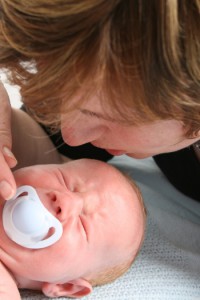Are you concerned because all you seem to be doing is stressing and worrying about your new baby? Do you check to see if she is breathing constantly? Are you worried about the safety of your child and can’t quit thinking about it? If some of these examples sound like you, you may possibly be experiencing OCD (Obsessive Compulsive Disorder) that many women deal with after giving birth.
In the spring of 2013, The Journal of Reproductive Medicine conducted a study of over 400 women and followed them from childbirth until their baby was six months old. Dr. Dana Gossett, assistant professor of obstetrics and gynecology at Northwestern University Feinberg School of Medicine, was the senior study author of the project. She stated that “Postpartum women may experience obsessive compulsive symptoms at much higher rates than at other times in their lives.”
OCD generally affects 2 to 3 percent of the overall population. This study found that 11 percent (basically one in 10 women) that gave birth dealt with OCD.
What is OCD?
Medicine.net describes OCD as “an anxiety disorder that is characterized by the sufferer experiencing repeated obsessions and/or compulsions that interfere with the person’s ability to function socially, occupationally, or educationally, either as a result of the amount of time that is consumed by the symptoms or the marked fear or other distress suffered by the person.”
What are some reasons women may get it after giving birth?
There are several reasons that have been proven such as stress that can actually trigger OCD. For those of you that have been a new mom before, as wonderful as giving birth can be, it is an incredibly stressful time in your life. Also, they believe hormone level changes cause OCD as well as changes in your brain activity after giving birth.
It is normal for all new moms to feel some level of anxiety. I remember after giving birth to my first child, I was up all night making sure she was breathing. However, after the first few nights I was fine. If, however, you are constantly obsessing and it doesn’t get better soon, you may be experiencing OCD.
How can you cope with OCD?
First of all, go see your doctor. Explain how you are feeling and he or she can help determine the level of OCD you may be experiencing. Also, talk about this with friends or family. Many may have been dealing with the same thing in the past.
Know that this will most likely pass and that you will not always feel as worried and obsessed as you are now. Sure, you are a mom and you will worry about your baby but hopefully not to the degree you may be doing it now.
If you are a new mother and concerned you may be experiencing OCD, please contact us and schedule an appointment at our Gainesville or Lake City office.
We care about BOTH your mental and physical health. For more information regarding pregnancy and after birth care, please check out our blog and knowledge center. We at All About Women wish you and your baby health and happiness!



